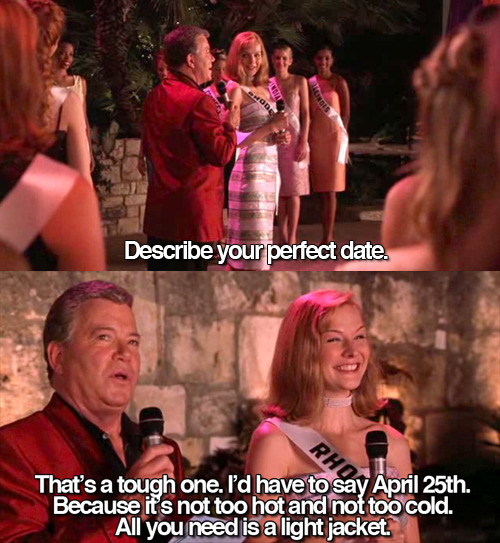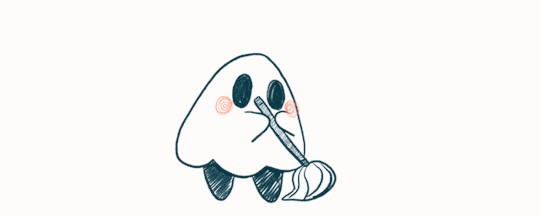A collection of random inconsequential things making my overwhelmed neurodivergent brain happy. PhD student in the West Midlands. She/her 🏳️🌈
Don't wanna be here? Send us removal request.
Video
Me when I smell yummy food. Also is it just me or does being a hedgehog look incredibly comfy?
crumch
168K notes
·
View notes
Photo
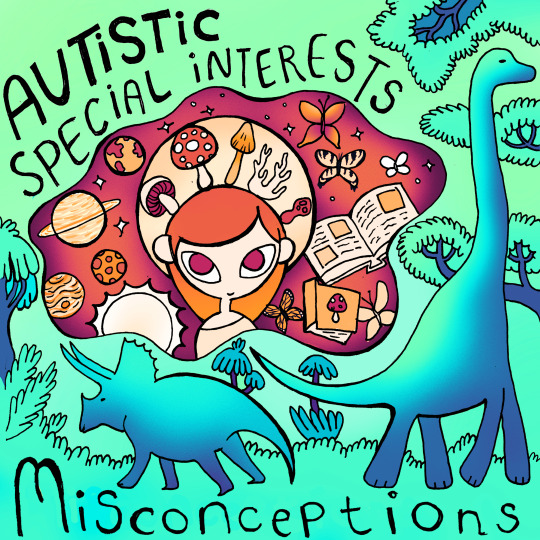
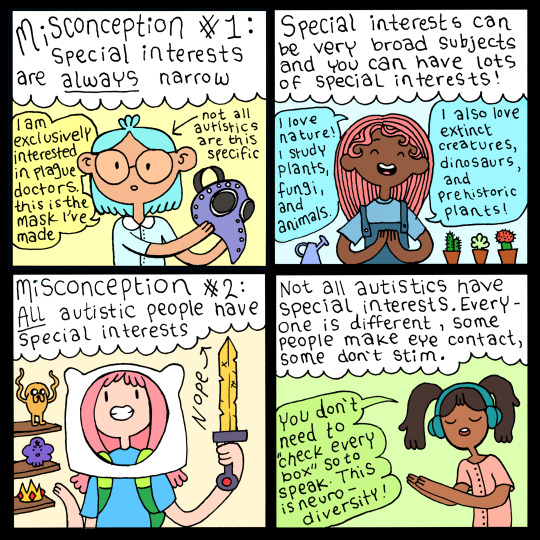
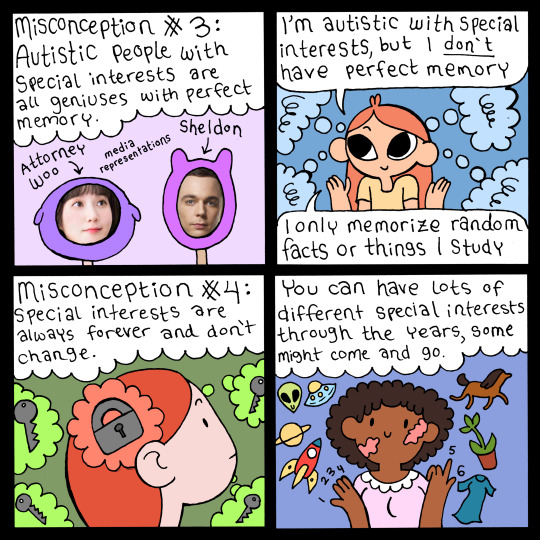
Autistic Special Interests: Misconceptions
4K notes
·
View notes
Note
TW for descriptions of Autism Speaks' disgusting and traumatising treatment of Autistic people, but I think it's important we speak openly about just how awful this organisation is.
Is Autism Speaks really as bad as people say it is?
Having been forced to deal with them and organizations like them, I can safely say “No.”
It is obscenely worse.
You see, any idiot can look at things like “we need a cure” and their anti-vaccination advocacy and realize how ridiculously stupid that it.
But that’s not what they sell to children’s hospitals. Instead, they push extremely unconventional medications to “help” autistic children (usually by sedating them into a catatonic state). I mentioned earlier that Risperidol eases overstimulation, but Autism Speaks doesn’t like Risperidol because it’s not controlling enough.
Autism Speaks absolutely loves “treatments” and “counselling” based around controlling everything autistic children do. Stimming, self-coping mechanisms, even strange and oddball quirks like kids who wear gloves everywhere, all of these are taken from them and doled out as privileges. It’s all about turning anything an autistic child likes into something they can control.
They treat these children like fucking animals and really enjoy forced isolation as a punishment. The IWK has several “Secure Isolation Rooms” that they will place autistic children in their care into for hours at a time unsupervised when they start acting out. And not “having a meltdown and might accidentally hurt someone” kind of acting out, even just mouthing off or getting lippy with a nurse.
I am personally convinced that the whole “cure” motto is a sham, because studies into Autism long ago disproved the theory that it was something that needed curing. Autism Speaks behaves more like a eugenics organization. And they are slippery bastards about it too.
I’ve had the displeasure of having to interact with them directly because they have such a stranglehold on Nova Scotia’s youth mental health that any counseling group inevitably gets calls from them. Speaking to them and hearing the tone with which they spoke about these poor kids made my fucking skin crawl.
If you’re an autistic child and they’re talking to your parents or counselor about you, they won’t even use your name. The Child, The Patient, and The Boy/Girl are all common ways to refer to these kids. On several occasions they’ve referred to some kid as “it.”
I’ve said before that Tumblr especially doesn’t quit know what Autism Speaks is, and that’s because their public persona is very carefully crafted. Their reputation is so cartoonish that doctors who don’t know better won’t believe it, and so they swoop in with a lot of pretty language and faux-politeness. The skeezy, contemptuous way they behave when they think they’re doing business is enough to make you fucking vomit.
You quickly learn why so many hospitals willingly work with them. They are very good at getting their claws into health care organizations because they have this almost sinister “Friendliness” to them, and when you combine this with the fact that a lot of child psychologists have absolutely no concern for the actual well-being of children (just making the parents happy so they continue footing the bill) you have a recipe for a truly horrifying experience.
I can’t fully articulate just how sickening they are. Take however bad you THINK they are, multiply it by a hundred, and then think about how Quentin Tarantino would inflate that to make a movie out of it.
That’s how fucking gross and vile they really are when they think nobody is watching.
~Lily
33K notes
·
View notes
Text
Fuck Autism Speaks
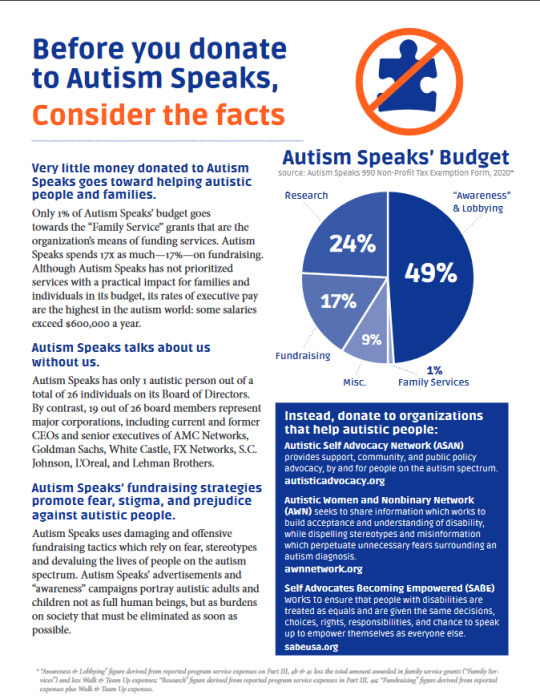
ASAN put out an updated fact sheet last year, and I don't think I've seen it going around. The numbers are just as terrible, but more up to date!
653 notes
·
View notes
Text
Pretend, for a moment, that you’re an 18-year-old teenager from a family living below the poverty line. One day, you make a silly mistake and get a ticket for it. Nothing major - maybe you rode the subway without a ticket or smoked too close to the entrance of a building. Maybe you were loitering. Either way, one thing is for sure: you definitely don’t have the money to pay the ticket. So you don’t. Eventually, you miss the deadline to pay your ticket, and you get a letter in the mail that says you have to go to court. But your life is chaotic, and a court date for a missed ticket is the least of your concerns. Your family moves constantly, which disrupts your life and puts you behind in school. You have one disabled parent and one parent who is always working, leaving you to raise your younger siblings by yourself. You have no means of transportation. There is rarely any food in the cupboards. The utilities are constantly getting shut off. The week that you were supposed to go to court, your family gets another eviction notice, your cousin ends up in the hospital, and your parent finds out that their disability payments are being reduced. So you miss your court date. Since you missed the court date, you automatically lose your case - now you have no hope of arguing your way out of the ticket, which you still can’t afford to pay. You can do community service hours instead of paying, but you don’t have time to do that, now that you have to work part-time and odd jobs on top of everything else to keep your parents off the streets and your siblings out of foster care. You know that you probably won’t finish high school on time, let alone fulfill your hours. You might be able to explain your circumstances to the judge, but you have no idea how to go about doing that now that you’ve missed your court date, your literacy skills are years behind thanks to your constant game of school roulette, and even though legal help is available to you, you don’t know how to access it or if you can afford to do so. But that’s still the least of your concerns - since you missed your court date, the judge has also charged you with failure to appear.
Which means you now have an active warrant out for your arrest. And just like that, you’re now a part of the criminal justice system. A silly mistake that a middle-class teenager could have solved with Mommy and Daddy’s chequebook in a single afternoon has caused you weeks or months of stress and headaches over a process you don’t fully understand, and has ended in criminal charges. Instead of having a funny story to tell over dinner when you come home from college next Thanksgiving, you are now facing additional fines (that you still can’t pay), the possibility of a couple of nights in jail, the possible suspension of your driver’s license, and the possibility of being taken into custody any time you interact with the police. The next time your parent comes home drunk and violent, or someone breaks into the house, you think twice about calling the cops - you now have to decide if every emergency is “worth” the possibility of being hauled off to jail. And in the meantime, the circumstances that caused that first mistake haven’t gone away - you still don’t have the money to pay for the subway, you are still more likely to live in a house filled with smokers, you still can’t afford quit-smoking aids, you still live in a chaotic household that deeply affects your mental health, and you still don’t understand the legal system or who you’re supposed to talk to for information and resources. So while those other teenagers get to go through life believing that they were “good kids who sometimes made silly mistakes”, you now get to go through life thinking of yourself as a criminal. And that might be the most damaging thing of all.
When I worked with homeless teenagers and young adults, I saw this process play out again and again and again and again. The kids often considered themselves “criminals” or “bad kids” because they had arrest warrants and criminal records, but few of them had ever actually committed a serious or violent crime - the vast majority were simply unlucky kids who did something stupid and didn’t have the skills or resources (or wealthy parents) required to get them off the hook. I had classmates in my upper-middle-class high school who did far worse things with far fewer consequences, because Mommy was a lawyer or Daddy was an RCMP officer, and some of those kids grew up to be lawyers or police officers themselves. The kids I worked with never got that opportunity. Second chances cost money, and the difference between a “crime” and a “mistake” has less to do with the offense, and more to do with the circumstances you were born into.
So when we’re talking about crime, punishment and who is “worthy” of being helped, maybe keep that in mind.
82K notes
·
View notes
Text
im so done with seeing articles about kids and screen time that doesnt mention parent behaviors even once. “kids are always on their phones” so are the parents! which the kids look to for how they should behave! ipad babies didn’t chose to only play on their ipads, thats what their parents gave them!
an anecdotal example: when i was a kid, all my parents would do in their minimal free time was watch tv and then they would be surprised when in my sister and i’s minimal free time we would also only watch tv/play video games. they scolded us for not reading books, but they never read books. they scolded us for not going outside but they never went outside.
“kids are always on their damn phones” my mom is in her 60s and opens up candy crush anytime she’s sitting — it isnt just the kids
170K notes
·
View notes
Text










Source ~ FB Lived Experience Educator
[Image ID: Ten images from Lived Experience Educator. Each are black with a rainbow squiggle running from the upper right corner down to the lower left corner in the background. White text boxes with black lettering.
Image 1: Autistic & ADHD burnout guide
including tips on supporting someone during burnout
@livedexperienceeducator
Image 2: signs of autistic/adhd burnout
exhaustion & fatigue
heightened sensory sensitivity
difficulty maintaining daily living skills like cooking, eating, hygiene
loss of spoken communication
changes are harder than usual
loss of interest in same foods
needing more alone time
Image 3: signs of autistic/adhd burnout
difficulty focusing more than usual
quicker to experience meltdowns
either feeling overwhelmed or underwhelmed
difficulty communicating with others
difficulty with memory
decisions are much harder
Image 4: causes of autistic/adhd burnout
sensory overload
intense levels of stress
sudden and lots of changes
barriers to support/lack of resources
masking
increased demands and expectations
suppressing stimming
Image 5: coping with autistic/adhd burnout
advocate for accommodations
reduce demands and expectations engage with your special interests stock up on your safe/same foods binge watch your same shows
use alternative communication
connect with community
set boundaries
Image 6: coping with autistic/adhd burnout
spend time stimming
attend to your sensory needs like creating a sensory safe space, reducing sensory input or increasing sensory input
ask for help and support at home
spend time with people who recharge you
take a break from social interactions
rest, rest and more rest
Image 7: reminders for autistic/adhd burnout
you are not a bad friend or partner if you need to withdraw and cancel plans.
there is nothing wrong with eating your same foods over and over again.
you're not lazy, demanding or too much if you need extra support during burnout
there is no time line on recovering from Autistic burnout, everyone needs a different amount of time to recover.
Image 8: It isn't the sole responsibility of Autistic and ADHD individuals to recover from burnout.
If burnout isn't caused by us but by our environment and society not accommodating our differences and needs, the responsibility of recovery shouldn't be on us alone either.
Image 9: supporting someone beforehand
create a burnout recovery plan together with tips on supporting us
learn to recognise our signs of burnout and offer support before we reach our limit
give us the space to recharge after coming home from work, school or other demands
support our special interests as they're a major part of our well-being; get involved, ask us questions or participate with our special interests too.
Image 10: supporting someone during
help us with our basic needs like food & hydration even if it's just reminders
make our environment more sensory friendly like reducing lighting
recognise that we may need alone time without from demands or expectations
don't ask too many questions, stick to yes/no questions
provide alternative forms of communications
End ID]
2K notes
·
View notes
Text
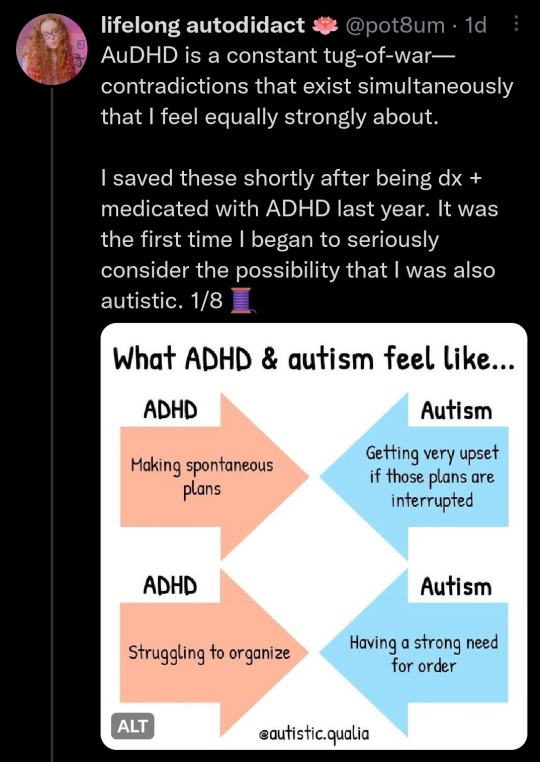
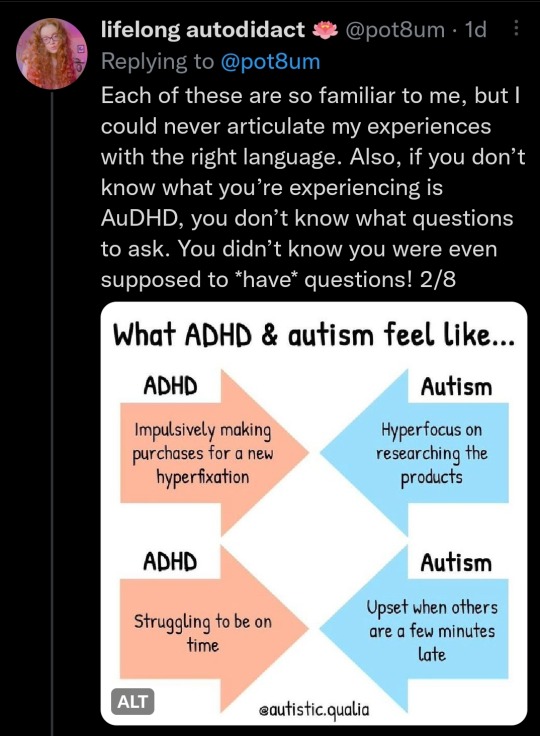
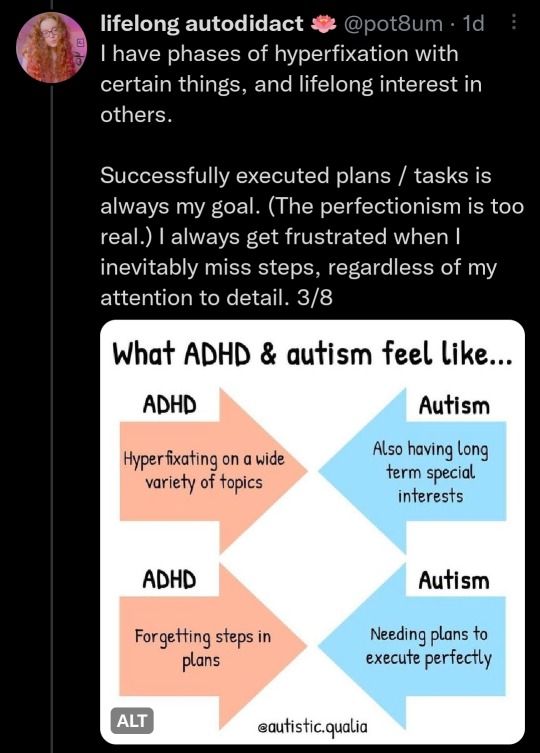
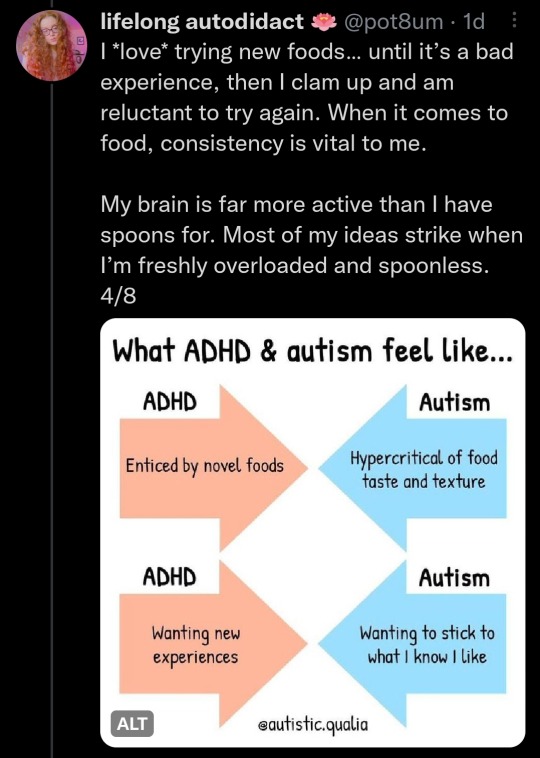
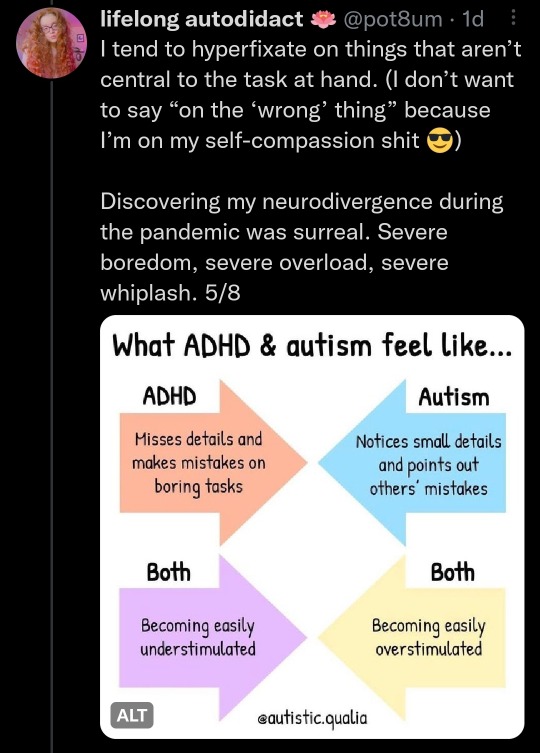


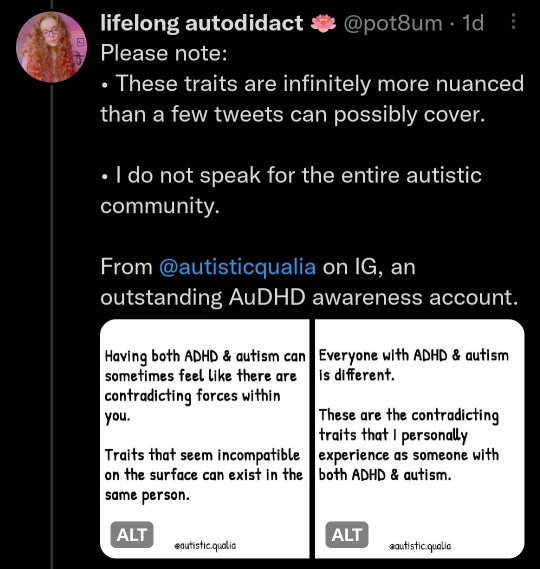
A series of 8 tweets on the experience of being autistic and ADHD (AuDHD) by @pot8um on twitter, image descriptions below cut.
I saved these shortly after being dx + medicated with ADHD last year. It was the first time I began to seriously consider the possibility that I was also autistic. 1/8
AuDHD is a constant tug-of-war— contradictions that exist simultaneously that I feel equally strongly about.
[image description: Two-column text inside orange arrows on left, and blue arrows on right. Title “What ADHD & autism feel like…” L column is ADHD; R column is autism. 1st row, L text: ��Making spontaneous plans”, R text: “Getting very upset if those plans are interrupted” 2nd row, L text: “Struggling to organize”, R text: “Having a strong need for order”. By @autistic.qualia]
Each of these are so familiar to me, but I could never articulate my experiences with the right language. Also, if you don’t know what you’re experiencing is AuDHD, you don’t know what questions to ask. You didn’t know you were even supposed to *have* questions! 2/8
[image description: Two-column text inside orange arrows on left, and blue arrows on right. Title “What ADHD & autism feel like…” L column is ADHD; R column is autism. 1st row, L text: “Impulsively making purchases for a new hyperfixation”, R text: “Hyperfocus on researching the products” 2nd row, L text: “Struggling to be on time”, R text: “Upset when others are a few minutes late”. by @autistic.qualia]
I have phases of hyperfixation with certain things, and lifelong interest in others. Successfully executed plans / tasks is always my goal. (The perfectionism is too real.) I always get frustrated when I inevitably miss steps, regardless of my attention to detail. 3/8
[image description: Two-column text inside orange arrows on left, and blue arrows on right. Title “What ADHD & autism feel like…” L column is ADHD; R column is autism. 1st row, L text: “Hyperfixating on a wide variety of topics”, R text: “Also having long term special interests” 2nd row, L text: “Forgetting steps in plans”, R text: “Needing plans to execute perfectly”. by @autistic.qualia]
I *love* trying new foods… until it’s a bad experience, then I clam up and am reluctant to try again. When it comes to food, consistency is vital to me. My brain is far more active than I have spoons for. Most of my ideas strike when I’m freshly overloaded and spoonless. 4/8
[image description: Two-column text inside orange arrows on left, and blue arrows on right. Title “What ADHD & autism feel like…” L column is ADHD; R column is autism. 1st row, L text: “Enticed by novel foods”, R text: “Hypercritical of food taste and texture” 2nd row, L text: “Wanting new experiences”, R text: “Wanting to stick to what I know I like”. by @autistic.qualia]
I tend to hyperfixate on things that aren’t central to the task at hand. (I don’t want to say “on the ‘wrong’ thing” because I’m on my self-compassion shit ) Discovering my neurodivergence during the pandemic was surreal. Severe boredom, severe overload, severe whiplash. 5/8
[image description: Two-column text inside arrows. Title “What ADHD & autism feel like…” L column is ADHD; R column is autism. 1st row, orange arrow, L text: “Misses details and makes mistakes on boring topics”, blue arrow, R text: “Notices small details and points out others’ mistakes”. 2nd row, purple arrow, L text: “Becoming easily understimulated”; Yellow arrow, R text: “Becoming easily overstimulated”. by @autistic.qualia]
Overthinking the stages of your emotional dysregulation is its own personal hell. When I’m lowest on spoons, I tend to ruminate the most. My thirst for knowledge is met by my shoddy working memory. I try recalling a fact that *I know* I read up on. Can’t. Frustration ensues. 6/8
[image description: Two-column text inside arrows. Title “What ADHD & autism feel like…” L column is ADHD; R column is autism. 1st row, purple arrow, L text: “Struggling from emotional dysregulation”. Blue arrow, R text: “Being a logical and analytical thinker”. 2nd row, orange arrow, L text: “Struggling to retain information”; Yellow arrow, R text: “Wanting to learn everything”. by @autistic.qualia]
It’s hard for me to Start the Thing. Once I start, I NEED to ride that wave! If I’m taken out of the moment, idk when I’ll be able to start back up. If I don’t say what I’m thinking *while* I’m thinking it, it’ll be forever lost. (Trying my best to work on this. It’s hard!) 7/8
[image description: Two-column text inside purple and yellow arrows. Title “What ADHD & autism feel like…” L column is ADHD; R column is autism. 1st row, L text: “Having difficulty sitting still”, R text: “Hypersensitive to other people fidgeting”. 2nd row, L text: “Interrupting others when they are busy”; R text: “Hate being bothered while in hyperfocus”. by @autistic.qualia]
Please note: • These traits are infinitely more nuanced than a few tweets can possibly cover. • I do not speak for the entire autistic community. From @autisticqualia on IG, an outstanding AuDHD awareness account.
[image descriptions: a box of text at left reads “Having both ADHD & autism can sometimes feel like there are contradicting forces within you. Traits that seem incompatible on the surface can exist in the same person.” A box of text at right reads “Everyone with ADHD & autism is different. These are the contradicting traits that I personally experience as someone with both ADHD and autism.”]
It's uncommon for me to see someone discussing the experience of being both austistic and ADHD, and this was articulated so well, I feel like it also describes my experiences. (The author is also an advocate for late diagnosis AuDHD adults, who has shared her experiences about working with dismissive, misogynist doctors.)
Bearing in mind that every individual is different, as noted by the tweet author, I feel like I am more autistic than I am ADHD, despite my ADHD diagnosis (and these two developmental disorders have many overlapping traits, of course).
I have never, ever understood the experience of "ADHD boredom" that I have seen some people describe. I am perpetually overstimulated, not understimulated, and I stuggle to process experiences and find enough time and space. Executive dysfunction also prevents me from starting/enjoying activities, as is typical with ADHD. It's not just a thing that makes it difficult to work on stressful or boring tasks; it prevents you being being able to commence fun things, like reading for enjoyment or watching a TV show you want to watch. And when I do manage to start the book/TV show, the stimulus is often overwhelming and I don't get very far.
15K notes
·
View notes
Text
Turns out that saying you're doing a PhD is much more fun than actually doing it 🤡




me this semester
17K notes
·
View notes
Text
Struggling with transitions isn't always externalized in the form of a meltdown. Here are some examples of things (from an autistic former early childhood teacher) that also count as struggling with transitions.
Note: I'm including things to do with adult transitions and childhood transitions here. Examples and explanations are given in italics.
Trying to politely decline to transition - sometimes, this may include lying about your wants/needs or not even realizing you want or need something because your brain isn't processing that information during the stress of a transition; "Becca, it's time for snack." "No thank you, I'm not hungry."
Undetectable self-harm behaviors - digging nails into palm, "itching" when you aren't itchy, internally degrading yourself, biting cheek or tongue, holding breath until you can't anymore. Self-harm during transitions is a common and valid struggle, even if you didn't try to use it as leverage to avoid the transition.
Undetectable stimming to regulate (very healthy!) - especially with objects that have a similar texture to one from the previous area or material
Slow or stuttered transitions - Starting to move on, but repeatedly having "just one more thing (you) forgot" or physically walking away slower possibly while staring at the previous area or material
Verbal shutdown (total or partial) during or immediately after transitions - this could be part of a more overall shutdown or exist on it's own
Fixating on the previous task/area/material - may show by excessively talking about the previous task long after others have moved on for example trying to tell everyone about your cool lego building or even showing them pictures of it (taking pictures is good coping mechanism for moving on from a toy) long after everyone stopped playing with or talking about legos, or if you were moving from legos to drawing, wanting to draw a picture of legos
Keeping materials from the previous task - if you were playing with legos, but have to clean up, you might keep some to build with or even a single lego on your person somewhere as a comfort. In larger/life transitions, you may refuse to get rid of something long past when it is socially acceptable (such as an ex's shirt) or taking something "strange" such as a piece of trim or a scrap of wallpaper from a previous house.
Brain fog, fatigue, disorientation, and/or dissociation during and/or immediately after a transition
Internal emotional distress during/immediately after transitions - due to autistic issues with emotional regulation, these emotions may last the rest of the day if not supported because of bottling up the emotions
Executive dysfunction post-transition - especially if you don't usually struggle with it or weren't before the transition
When going to bed, insomnia is an extremely common presentation of struggling with transitions
Feel free to add on! Preferably in the text of the reblog rather than in tags so I can reblog this with your additions, but either works!
I also want to specify that not all of these are harmful or negative responses to transitions. If you do these things and they help you without hurting anyone, that's fine! This is just to help give you the language to get help as needed because it's much easier to get help if you say "I struggle with transitions because of my autism" than "I'm struggling right now but I'm not sure why".
482 notes
·
View notes
Text
reminder to:
straighten your back
go pee goddAMN IT STOP HOLDING IT
go take your meds if you need to
drink some water
go get a snack if you havent eaten in a while
maybe wander around the house/stretch a little if you’ve been sat at the computer a while (artists especially: sTRETCH THOSE WRISTS)
reply to that text/message from earlier you’d forgotten about
maybe send a nice lil message to someone having a bad day?
1M notes
·
View notes
Text
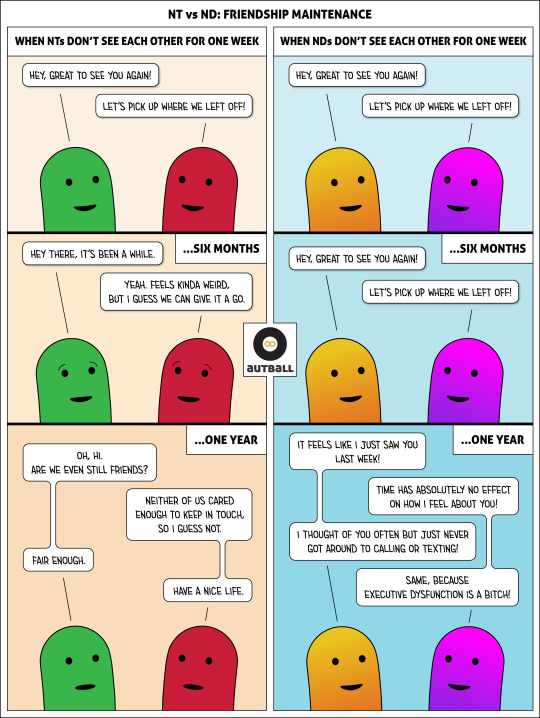
Sure, a lotta people have what’s depicted on the right with their besties, but I’m tellin’ you - this is how I am with EVERYONE.
Disclaimers (because some of y’all just like to fight):
1. This is a cartoon, not a research paper. Generalization and exaggeration have been employed and are allowed, so please save your “Not All…” energies for something else.
2. I have used ND as a shorthand for autistic/ADHD, and NT as shorthand for NOT autistic/ADHD, which is popular but technically improper usage. MANY other things count as neurodivergence, which makes neuronormative a more accurate term to use when referring to people who “don’t get” a particular flavor of neurodivergence. I only have so much room in these little boxes though, so I hope you’ll forgive me for working with what I got.
3. I didn't pull this outta nowhere. Friendship Degradation Mechanics are a thing, and other autistics and ADHDers have written about why we don't experience them the same way NTs seem to. Go googling if you want to know more.
(Image description in Alt Text.)
2K notes
·
View notes
Text
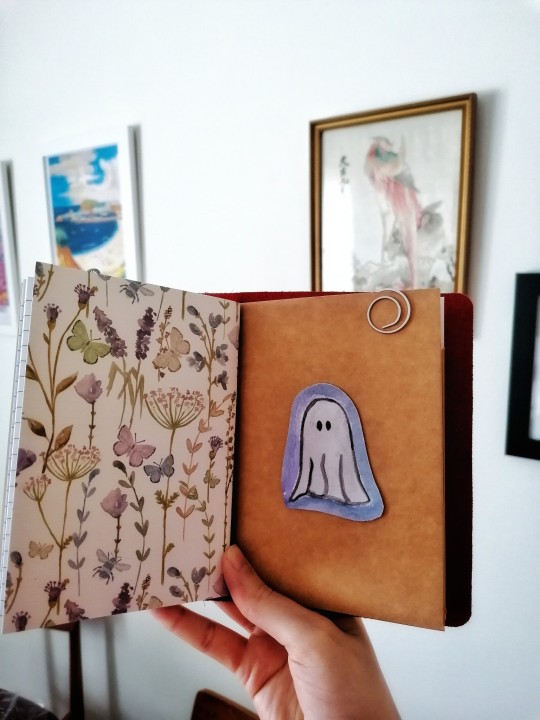
Lil watercolor ghosty friend for my traveller's notebook
#adhd hyperfixation#traveler's notebook#journaling#ghost#watercolorillustration#special interest#journalingcommunity#stationery
7 notes
·
View notes
